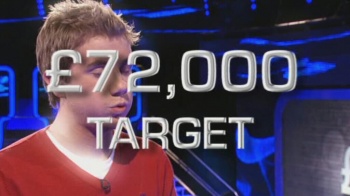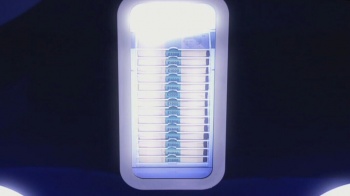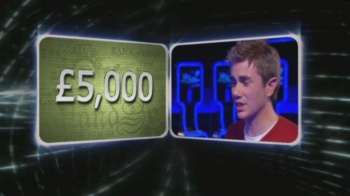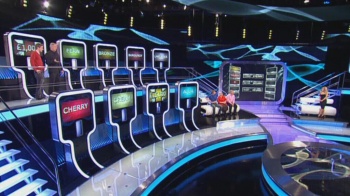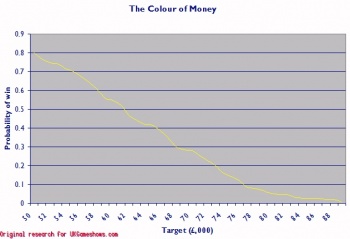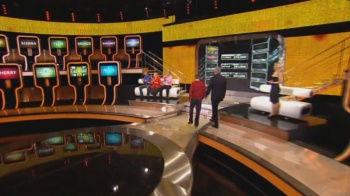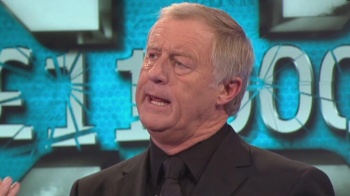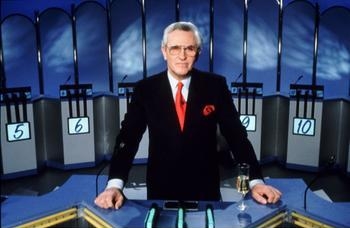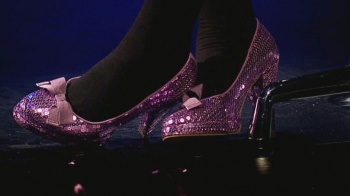Weaver's Week 2009-03-15
Last week | Weaver's Week Index | Next week
Contents |
Seeing red
One of our co-writers tried to see The Colour of Money on the internet-based I-tv Player. All he saw was a run of adverts and break bumpers, with no actual content. Clearly, the I-tv Player has a Lack of Content filter, ensuring that only the best ITV programmes are made available over the interwebs. Good news for ITV Nightscreen Gold, there.
The Colour of Money
12 Yard Productions for ITV, about 6.45 Saturday nights
We were rather alarmed to read publicity to the effect that ITV's new Saturday night entertainment The Colour of Money could be a potential deathtrap.
Apparently, all contestants had to run on a treadmill to get their hearts racing. Was this to ensure they were fit enough to tackle the New Krypton Factor assault course? Or to ensure that they could keep up with Chris Tarrant rushing about the studio? Er, no, it's just a gimmick to tie in with the conceit that the show might be a bit stressful.
Having seen it, we reckon that other shows should ensure their contestants are not exposed to potential death traps. For instance, have the safety people not seen Battle of the Brains? Do they not realise that, during the walk from their place behind the desk, these brains could trip over and smash their face on the studio floor? Or get a soft landing, on Nicky Campbell's head?
Over on Spin Star, if someone really strong pulls the lever really really hard, it could come away in their hands, and the unfortunate person could fall over and crash into the cameras and stick their hand into an electrical socket and have to go to hospital for a very long time ie forever.
And don't start us on the dangers of driving while blindfolded by a thing with a very long trunk as happens on Kerwhizz, otherwise we'll be here for a very long time ie forever.
ITV advertised the cash-in flash-in game as being "the most stressful game on the internet". It certainly was for viewers outside the UK, who found their access blocked. Unless they did something utterly confusing with their proxy settings, and we really have no clue how on earth one does that. According to viewers in the UK, it was somewhat less than compelling to play.
Good news for Johnny Foreigner, and entirely like the game, then. Here's how it works. Player is given an arbitrary target, and picks one of twenty coloured machines. Inside is an amount of money, paid out at £1000 per second. Contestant can stop the machine at any time, taking the money paid so far. If the machine runs out of money, it pays nothing. Repeat until the contestant has reached their target (in which case they win it) or they've played ten machines and not made their target (in which case they leave with nothing).
Oh, there are other elements. Chris Tarrant pulls a silly face, and a model in gratuitous high heels gives statistics for people who don't actually understand statistics. Members of the contestant's family are in the studio, and the show is punctuated by "coming up" and "previously" stings similar to those that ruined Unanimous. And piles of cash rise up from the slots underneath the machines, a fact that is not mentioned by anyone at all.
Now, if you're into this sort of thing, the game could be quite exciting. People who like seeing things tick over once per second before stopping will be fascinated. They could always watch a clock and stop it on occasion.
We found the show got very boring very quickly. There's absolutely no skill involved. People here aren't asked to know fifteen random factoids, or to convince strangers that they are holding the best hand, or prove they can make better anagrams than the next person. No, all they've got to do is shout "Stop!" a metric dozen times.
Oh, and they've got to come up with a compelling emotional hook. "My boyfriend is leaving me for a job in Afghanistan," said one contender. "I want to get married," said another. "I want to buy a car for my granny," offered someone else. "I want to see a decent game of cricket, where England are decent," said a passing Australian. "I want a new coat. One of those nice gabardine ones," said a man in an Irish accent. "I want to see Mike Yarwood," said a man with an Arabic accent; and a man in an eye-patch said, "I wants a training day. And a parrot. I calls him Hatfield, so I does." Apparently, the film is meant to make the viewing public root for the contestant, and has nothing to do with spinning the show out hideously, or recycling obscure in-jokes that date back to the Thatcher era.
We taped the first episode, it had a nominal running time of 70 minutes. With only the lightest editing, we chopped it down to 43 minutes, and the real length was shorter still. Before and after each advertisement break came a huge preview of what's going to come up on the remainder of the programme. OK, it doesn't actually reveal the result, but it shows just about everything else.
We watched the first episode right through, apart from the previews and the second contestant's story. Don't just sit there wittering, play your simple little game. And it is a simple little game; with the most rudimentary strategy, the game quickly degenerates into a test of luck like certain other ones we could mention.
We spent the second contestant's game making our rudimentary strategy. Play to the median value, rounding fractions up, and playing on to the next safe value if that's possible. A quick piece of Monte Carlo modelling (repeated trials to determine the maximum win) shows that we can expect to win as follows:
Even the lowest target will fail one time in five, there's an even chance of winning £61,000, and if the contestant is set a target above £70,000, there's less than one chance in four that they'll win, allowing us to go off and find something less boring to do. Say, devise a more complex strategy that beats this one. Or, if we don't want to tax our brain at all, watch Paris Hilton's British Best Friend. Or we could try to explain to the host why, if the £1000 machine has gone, the contestant with £2000 to get from one machine cannot possibly lose, unless he's a grade-A pillock who would be too thick for Paris Hilton Etc.
There was an interesting article in the Independent, saying that successful cheap game shows tend to run and run. Hello, Going for Gold. Welcome, The Weakest Link. The key difference between the successful cheap shows and The Colour of Money is scheduling. At heart, the newcomer is a daytime show, with all the interest of a daytime show. With prizes halved, it would fit into the Golden Balls slot.
The programme's been in development for about 18 months, and was rejected at least once by ITV's commissioners. They were right; blatantly derivative and unimaginative shows tend not to have a long shelf-life. For every Dancing on Ice, there's an ITV4-full of Tycoon.
And yet, the scheduling was poor. Episode one was hammocked between the hugely successful Harry Hill and the hugely successful Antan Dec. It managed to lose almost half the audience, and (just) failed to secure four million viewers. The Indytab article suggested it would have to make 5 million else there'll be trouble. The second episode benefitted from being opposite the dire Ireland – England rugby match, and last night's third episode was always going to be delayed for football.
Let's give credit where it's due: the set design is brilliant. We mean that literally and figuratively. It's brightly coloured, it changes colour, and it doesn't have a single flashing light anywhere. We're also fans of the piles o'cash, especially as no-one else seems to have mentioned them. Or even spotted them. And there's merit in the format – it could be used as the prize round on a quiz, with the winner asked to pick five red boxes ... er, colours, and stop them at whim. Sort of a bit like the final of The National Lottery Big Ticket, only completely different, obviously, because no-one likes to be associated with Saturday night flops.
But that's the limit to our interest. We just can't get excited by this show. It's just banal, dull, tedious, and not really worth our time. Even as a daytime show, it's not that good – we'd sooner have the mildly interesting tactics of The Great Pretender.
No, this isn't the most stressful show on television. It's about as stressful as an episode of Treasure Hunt where the team made a complete hash of the first clue, and went into the first ad-break five minutes behind schedule. Actually, no, it's less stressful: at least with Treasure Hunt we could entertain ourselves by solving the remaining clues with the contestants. Anneka Rice's charming byways have become a dull, featureless motorway, and Tarrant is on cruise control, making a beeline to the horizon.
For shouting-at-your-screen excitement, nothing beats Interceptor. In this seminal show, two yuppies run about carrying backpacks while being shot at by a villain in a chopper. As exhausting as it was, the real stress comes in not seeing the programme twenty years on and shouting, "Oi! ITV! Give us some decent shows, not your run-of-the-mill tat".
Countdown Update
After the heights of the Championship of Champions, qualification for the next Finals Week began in February. Zoe Bowman returned for a second win (219 points), Lisa Thomson managed three (322), with Mike Spellar winning one game (154) for the new teapot. It's almost the same as the old one, but doesn't sing Des O'Connor tunes.
Janet Scowcroft (2 wins, 221) was next in the champion's chair, followed by Kate Richardson (3 wins, 308). It's fair to say that the series was just bobbing along until Neil Zussman took the game by the scruff of the neck. He had eight wins, one of them was on a tie-break, and put in some very good performances en route to 758 points. Ann Abel took the vacant chair, making two wins and 222 points.
She was beaten by Kirk Bevins, who notched up a phenomenal 127 points, a record for a challenger to the defending champion. Greater feats were ahead of him: the expert researchers (mostly former contestants) at the C4Countdown forum believe Mr. Bevins's third win was a perfect game. Top marks in every letters game, top marks in every numbers, and solving the conundrum. Perfect games in Countdown are rarer than rocking-horse droppings; C4Countdown reckons there hasn't been a perfect game since Countdown adopted its current format in 2001. At the time of writing, Mr. Bevins has six wins under his belt, and will (surely!) be going for octochamp status on Tuesday.
Mastermind
Heat 21
"Welcome to the toughest quiz on television," said John Humphrys at the start of tonight's show. "It's the toughest quiz on television," said Ben Shephard at the start of every episode of The Krypton Factor this year. But which is tougher: John Humphrys or Ben Shephard? There's only one way to sort this out!
Yes, welcome to the Comic Relief Night edition of Mastermind, where it's light-hearted entertainment all the way. David Porch is first up, telling us about the Life and Films of Sidney Poitier. The subject here was a film actor of the immediate post-war era. The contender knows his subject, ending on 14 (1).
Paul Moorhouse continues the high comedy theme of the night, taking British Trotskyism To 1949. This was a collective of comedians, followers of the teachings of the Marx brothers Zeppo, Groucho, and Karl, and directly inspired by Leon Trotsky. He believed in permanent revolution, and insisted on spinning the roundabout at the travelling circus, stopping only when Gummo buried an ice-pick in his head. Or something like that. The contender knows his subject, finishing on 12 (0).
Howard Pizzey offers British Number One Hit Singles 1952-2000. We're genuinely surprised that no-one has ever taken this subject before, it's a large topic stretching from Bob the Builder to Al Martino, via Timmy Mallett and Westlife. And more credible performers. The contender would be equally at home on Counterpoint, scoring a remarkable 14 (0).
Our final contender is Jessica Wilkes-Mellor, she tells us about the Life and Career of Edie Sedgwick. The subject was an actor and socialite, propelled to stardom on the arm of Andy Warhol. From a very difficult set of questions – concentrating on the minutiae again – the contender scores 6 (5).
Jessica Wilkes-Mellor is back again, and defends the independent fame of Sedgwick. Vogue magazine appointed her Girl of the Year in '65, she popularised the style of putting sunglasses on one's head, and suggests that Warhol leeched off Sedgwick's fame, rather than the other way round. We should also note how the contender's fingernails (long, painted yellow) and shoes (glittery, pink) are remarked upon; that she could be mistaken for one of The Saturdays is not. Hidden transmission indicator of the week is a question on paraskevidekatriaphobia. Fear of Friday the 13th; the contender ends on 11 (10).
Mr. Moorhouse says there's at least one Trotskyist left in the country: him. He describes the presently-accepted definition of communism as a form of dictatorship, and Trotskyism as a democracy for the benefit of the masses. We'll be keeping an eye on the Morning Star to see how this exchange plays out amongst the true believers. TV Cream will be unhappy that the contender doesn't remember John Noakes from his thirteen years on Blue Peter; current children's telly star Oucho will be pleased that he correctly defined "potbound". The round ends on 25 (0).
It's a stiff target for Mr. Porter. Sidney Poitier was the first big cinema star who was black; the contender would prefer to discuss Poitier's brilliance on screen than his skin pigmentation. Another hidden transmission indicator comes with the Red Letter Day, as opposed to Red Nose Day. He takes a pass on the final question, the definition of "paraphenalia", and ends on 25 (2).
Mr. Pizzey is asked what the current number one single is. He doesn't have a clue, which is probably because this show was recorded about ten months ago, and if he knew what it was then, he'd surely have put a bet on Kato Star in the Gold Cup. Though he starts with a run of passes, Mr. Pizzey soon gets into his stride, remembering Reggie Maudling and the philosophy of sybarites. Sadly, he leaves himself just too much to do, ending on 25 (3).
The three contenders on 25 points are separated by their passes, so Mr. Moorhouse wins, having not passed all night.
Just when we thought we might get a winner before University Challenge re-starts comes news that Mastermind will not be airing on 27 March. They're replacing it by world championship track cycling. One more postponement and they will hit Wimbledon!
This Week And Next
After a decade in the wilderness, Masterchef is to move back to BBC1. The cookery show has been on BBC2 since 2000, but – as we'll see in a moment – has proven one of the second channel's most popular programmes.
This week's Entirely Manufactured Row comes from Eurovision headquarters, where GPB was been told to change the lyric and title of their entry. According to the EBU's scrutiny group, "We don't wanna put in" is a political entry, and no politics is allowed on the Eurovision stage. GPB told the EBU to OFF, and something else that isn't a three-letter acronym. If we're to believe the EBU's statement, how come entries are attributed to the political creation that is the sovereign state (in this case, Georgia) rather than member broadcasters? Can the continent spot the difference between FTV, MTV, HRT, LRT, SVT, and TRT?
Over in the Americas, Pop Idle Us reached its studio shows this week, with thirteen contestants remaining. Many years ago, the producers only bought a block of twelve lines, never anticipating an extra contestant. The next number – 0898 LOSER 13, or some such – had been bought by a sex line, and viewers had to dial an unrelated number.
That caused no trouble from the viewing minions. What did heat them up was the new rule, that the judges can overturn the public's decision to remove someone from the contest. "It's unamerican", claimed the most ill-informed critics. Having the judgement of the people subject to a steward's enquiry (as had happened in two of the last three presidential votes) and subsequent disqualification (as happened in half those enquiries), no that would never happen. The critic does have a minor point: Mr. Cowell's retinue having the final word was piloted on Pop Idle France last year. Apparently. Everyone we know watched the superior Star Ac.
Fans of Total Wipeout will no doubt be pleased to hear that UKTV has bought the US series. It'll go out on their Watch channel from the Easter weekend.
Alice Mundy was this week's big winner, scooping the £250,000 top prize on Deal or No Deal.
We'll zip through the big-hitters for the week to 1 March (9.5m for Dancing on Ice, 6.9m for Comic Relief Dancing, 6.25m for Antan Dec), because the big battle was on BBC2. We mentioned how University Challenge and Masterchef reached their finals in the same week. Though the cookery programme won the overnight battle, University Challenge claimed victory once timeshifters were included, and won by a gnat's crochet: 5.61m to Masterchef's 5.58m. Both thoroughly eclipsed The Colour of Money (4.4m). QI XL had a year's best, 2.3m.
No surprises on the cable channels: Come Dine With Me (More 4, 755,000) beat Gladiators (The Satellite Channel, 560,000) and the surprisingly popular Paris Hilton's British Best Friend (ITV2, 525,000). We fully intend to review the last of these next week. Pop Idle Us (ITV2) finished behind America's Next Top Model (Living), and Millionaire on Challenge had its best performance of the year (120,000 viewers). S4C's talent show Can i Gymru (35,000) was less popular amongst UK viewers than RTE's All Ireland Talent Show (45,000).
Coming up next week: A Question of Genius (BBC2, 4.30) has Kirsty Wark asking difficult questions, and Taste the Nation (ITV, 5pm, not Scotland) has Nick Hancock hosting an inter-country cook-off. Fiver has Step It Up and Dance (9pm Monday), and Genius moves from the wireless to BBC2 (10pm Friday, England and Scotland only). Next Saturday's highlight is the annual Questions Pour un Champion Internationale (TV5, 8pm).
To have Weaver's Week emailed to you on publication day, receive our exclusive TV roundup of the game shows in the week ahead, and chat to other ukgameshows.com readers sign up to our Yahoo! Group.



